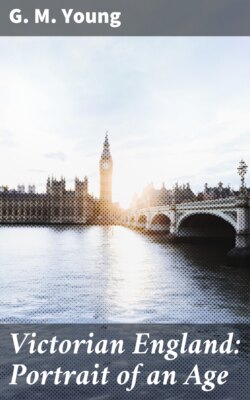Читать книгу Victorian England: Portrait of an Age - G. M. Young - Страница 3
На сайте Литреса книга снята с продажи.
INTRODUCTION
ОглавлениеTable of Contents
In the First War, partly from curiosity and partly for comfort, I set myself to study the course and outcome of the great Napoleonic struggle. When Waterloo had been fought and won, I went on to the years of peace and distress which followed, and so to the collapse of Tory domination in 1830, to the Reform Bill and the New Poor Law, to the England of young Gladstone, young Tennyson, young Darwin: of the Oxford Movement: of the Benthamites: of Factory Inspectors and School Inspectors: of Chadwick and Horner: of Sybil and the People’s Charter. As I read, my picture of Victorian England grew clearer, and it was a very different picture from the one at that time commonly accepted by popular opinion and set out by popular writers. So, in a fit of wrath over what seemed to me a preposterous misreading of the age, I wrote an Essay[1] which was intended as a manifesto, or perhaps an outline for others to fill in. I had had little or no experience of writing, and the Essay was in places sadly crude, and in places badly rhetorical. But it did, I found, induce some readers to reconsider their ideas, and re-orientate their attitudes: ideas and attitudes generated rather by an emotional antipathy to the Victorian Age than by any insight into its historic significance. So when Oxford asked me to plan a book on Early Victorian England, to match those on Shakespeare’s England and Johnson’s England, I felt I was committed to do my best, and I think I can justify my rashness by saying that I persuaded Sir John Clapham to write the chapter on ‘Work and Wages’.
For myself I reserved the final, summary chapter, to be called ‘Portrait of an Age 1831 to 1865’, the Reform Bill and the death of Palmerston being, as it were, the natural limits of the period. In the Essay of which I have spoken, I had, somewhat paternally, exhorted young historians to study the methods of the great masters. I followed my own advice with the result that my first draft rapidly degenerated into a flat imitation of Macaulay’s Third Chapter. It went into the fire. The second was more promising, but, as I was thinking it into shape, I found myself asking, what is this chapter really about? For that matter, what is History about? And the conclusion I reached was that the real, central theme of History is not what happened, but what people felt about it when it was happening: in Philip Sidney’s phrase, ‘the affects, the whisperings, the motions of the people’; in Maitland’s, ‘men’s common thought of common things’; in mine, ‘the conversation of the people who counted.’ Who were they? What were the assumptions behind their talk? And what came of it all? Then ‘the boy born in 1810’ offered himself as the interpreter of that talk, and my first paragraph wrote itself.
I had always been convinced that Victorianism was a myth, engendered by the long life of the sovereign and of her most illustrious subjects. I was constantly being told that the Victorians did this, or the Victorians thought that, while my own difficulty was to find anything on which they agreed: any assumption which was not at some time or other fiercely challenged. ‘Victorian History’, I had said, ‘is before all things a history of opinion. To see ideas embodying themselves in parties and institutions: institutions and parties closing in upon ideas: to show old barriers sometimes sapped, and sometimes stormed, by new opinions: positions once thought impregnable abandoned overnight, and forces once thought negligible advancing to unforeseen victories, that is to understand Victorian history.’ And the historian must be in sympathy with them all.
So conceived, my final draft did not dissatisfy me. I thought the outlines were true, the incidents fairly selected, the omissions justified, though I might with advantage have found space for the Mutiny and the transfer of India to the Crown. But, when I was asked to expand my chapter into a survey of the whole reign, I found myself involved in difficulties which I could not always master. I see now that I should have carried my book to 1914, and treated Late Victorian and Edwardian England as the ancien régime of the England in which I was writing. I could then have shown, more clearly than I have, the ecumenical significance of the age, revealed not only in the foundation of the great Dominions but in that marvellous network of commerce and finance which may truly be called a World Economy, and which was created by the genius, and sustained by the strength of Victorian England. That is what I should try to set out if I were beginning afresh. But as the greatest of our masters has said, ‘where error is irreparable, repentance is useless’.
G. M. Y.
1952
| [1] | Published as ‘Victorian History’ in Selected Modern Essays: Second Series (The World’s Classics, No. 406. Oxford University Press, 1932). |
